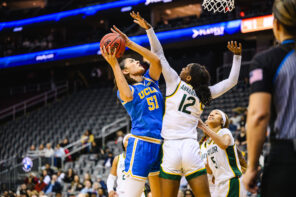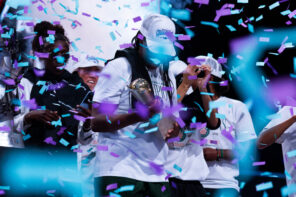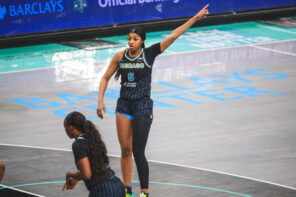When the WNBA offseason commenced, two teams began said offseason with eyes on making a change at head coach.
The Indiana Fever and the New York Liberty. Both teams entered the season with women coaches with the Fever’s coach being an African-American woman in Pokey Chatman.
Both Chatman and Katie Smith were let go in what were surprising changes. Chatman was surprising because she appeared to be taking her young team, chock full of top draft picks, in the right direction. Indiana’s roster includes Kelsey Mitchell, Tiffany Mitchell, Victoria Vivians, Teaira McCowan and Stephanie Mavunga and Chatman’s Fever finished only two games out of the eighth seed in the playoffs.
The Fever, though, did name another woman to take over in Chatman’s stead when they announced longtime Washington Mystics assistant Marianne Stanley as its new coach.
As for the Liberty, their change at coach was coupled with another much-ballyhooed move it made as the team is relocating from White Plains’ Westchester County Center to Brooklyn’s Barclays Center. With names such as Chatman out there, casual fans may think that it would be wise to bring someone with her stature and track record to lead Tina Charles, Kia Nurse, Asia Durr, Amanda Zahui B, and co. (Sabrina Ionescu, perhaps?) into Atlantic and Flatbush.
Instead, a report came out that listed Lynx assistant Walt Hopkins as well as Mystics assistant Eric Thibault as the top candidates for the New York job, a job that has to be more attractive to prospective suitors with the move to Brooklyn. Eventually, the Liberty decided on Hopkins as coach.
When this became known, the conversation immediately turned to a relevant point – eight of the 12 WNBA coaching positions are held by men. The exceptions are Cheryl Reeve (Lynx), Nicki Collen (Atlanta Dream), Sandy Brondello (Phoenix Mercury) and Stanley.
In addition, only two of those coaching positions are held by African-American men in James Wade (Chicago Sky) and Derek Fisher (Los Angeles Sparks). The WNBA as a league is almost 90% African-American, yet eight of the 12 main coaching positions are held by men.
As progressive a league as the W is, one would believe that big names such as Fred Williams in addition to Chatman would still be in possession of head coaching positions. In fact, Skylar Diggins-Smith tweeted out another interesting suggestion:
*taps mic*
We need more WNBA legends coaching in the W!
That’s the tweet.— Skylar Diggins-Smith (@SkyDigg4) January 8, 2020
As of the 2021 season, the WNBA will be 25 years old. So the league has definitely reached the point where we could see some of the W’s first stars as current coaches. Sheryl Swoopes is an assistant coach with Texas Tech. Tina Thompson is a head coach at Virginia. Cooper is currently coaching Texas Southern and previously coached the Phoenix Mercury.
Teresa Weatherspoon previously coached Louisiana Tech. Lindsay Whalen is now coaching her alma mater Minnesota. And that’s not even mentioning what Becky Hammon has been doing with the San Antonio Spurs or what Lisa Leslie has done within the Big 3 ranks. One article even mentioned why the Liberty should have considered Hammon (who played for New York from 1999 to 2006 after being undrafted) for its opening.
But it is a healthy conversation to have, especially given that we still do not have a woman head coach for any men’s team in any of the “core four” sports (although Hammon displayed interest in the New York Knicks job recently after the canning of David Fizdale). The Mystics’ Kristi Toliver is an NBA assistant coach with the Wizards, the Mystics’ sister team within the Monumental Sports and Entertainment conglomerate.
One way to do so is to ensure minority coaching candidates as well as women coaching candidates can rise through the coaching ranks as assistants to the point where more can become head coaches. This is also a solution many have mentioned on social media. It should not be like the NFL that only uses its Rooney Rule to interview black candidates that the teams have zero intention on hiring.
Even outside of simply coaching, let us also remember that the Liberty have a black Chief Operating Officer in Keia Clarke. And that Magic Johnson is part of the Los Angeles Sparks’ ownership group. In fact, the last WNBA league president was African-American. While names such as Nancy Lieberman, Jenny Boucek, Amber Stocks, Katie Smith, Vicki Johnson and “Showtime” Michael Cooper do not always grow on trees, more has to be done to ensure these names get fair shakes if the WNBA wants to maintain truth in its image as a progressive sports organization – one that it did a lot of during the Lisa Borders presidency. Also, the last two WNBA presidents prior to Cathy Engelbert’s commissionership – Borders and Laurel Richie before her – both African American women.
That said, that is not a slight against Hopkins. He is another branch of the Cheryl Reeve coaching tree, the very same coaching tree that produced Wade and his budding success in Chicago. New York is hoping that the Reeve tree leads to renewed fortunes in Brooklyn as it has in the Windy City.
One interesting aspect about the Sky is that they have hired three consecutive African Americans as its head coach – Chapman, Stocks and Wade. Chicago has had a black head coach since 2011 – Chapman’s first year.
In many ways, the Sky pre-Wade and the Liberty pre-Hopkins have a lot of similar qualities although Chicago’s core (Courtney Vandersloot, Allie Quigley, Stefanie Dolson, Diamond DeShields, Gabby Williams, Katie Lou Samuelson) is a mix of veteran and young talent while New York has been getting younger by transitioning away from veterans such as Sugar Rodgers, Epiphanny Prince and Shavonte Zellous and to Kia Nurse, Asia Durr and the likely drafting of Sabrina Ionescu.
Both teams have the talent to put together successful seasons, but what was missing in the Sky’s case was the coach. This summer, we will see if the same is true for New York.
After the last couple of years of forgettable Liberty basketball which saw the team play in what many could consider a forgettable arena that may or may not even count as a sporting venue, New York’s prime directive is to field a team that can return the Liberty to its previous success – and then some. The Liberty are the WNBA’s version of the Atlanta Braves – lots of playoff appearances, but (sans 1995 in the Braves’ case) lots of near misses in those playoffs.
So while the main directive of New York general manager Jonathan Kolb may have been to find who the organization felt was the best coach and the best fit to return the Liberty to its winning ways (and to draw 8,000+ fans to Barclays consistently), hirings such as Fisher to the Sparks and Hopkins to the Liberty (and even Brian Agler to Dallas and Wade to Chicago from last offseason) expose a weak spot within the WNBA – and its uber-progressive message.
Cooper and Corey Gaines are the only African American coaches to win a WNBA championship at this point. Gaines was the coach of the 2007 WNBA champion Mercury. The late Anne Donovan, Lin Dunn, Reeve and Sandy Brondello are women coaches that have won WNBA titles.
Here’s one direction this conversation has the potential to go into. The last major team-based position to be filled is general manager of the Los Angeles Sparks. That opening came about after Penny Toler was let go from the organization following a 20-year tenure not to mention two years as a player.
Toler, in fact, scored the first-ever WNBA basket. She was let go following that explosive Ramona Shelburne ESPNW article that illustrated why Fisher only played Candace Parker 11 minutes in Game 3 of last year’s semifinals after the Sparks were down 2-0 to the Connecticut Sun.
The article mentioned an n-word and profanity-laced tirade she gave in the Los Angeles locker room after Game 2 – one she acknowledged occurred. Said article also mentioned a disagreement between Fisher and Parker in strategy. While the Sparks have yet to name a new GM, the conversation on diversity and hiring in the WNBA is sure to continue if Toler’s successor is not a person of color, and especially if the successor is not a woman of color.
Remember, the 12 markets the WNBA represents are also some of the most diverse in the country, especially Los Angeles and New York, the W’s two flagship markets. Meaning representation has to be a central part of the conversation.
It must be said though that the W has consistently received high ratings for diverse hiring ever since the league was founded in 1997. The Institute for Diversity and Ethics in Sports (TIDES) has given the WNBA consistent high marks for attempting to make its front offices as diverse as its on-court product. Granted, its 94.8 rating Richard Lapchick and TIDES gave the W is down from its 2018 rating of 97.6 when it set a record.
More than ever in today’s day and age, diversity and representation matter. Player-wise, the WNBA, NBA and NFL have taken the lead via its own players in ensuring that at least one aspect of their leagues are a reflection of diversity. And while we may not want coaches to only be hired because of their skin color as that would hurt the cause more than help, we all want the WNBA to be a bigger and better league.
The future may be as bright as the vibrancy on the Liberty’s new black, white and green color scheme and the on-court and off-court moves could mean that Hopkins will be the one who will lead New York’s turnaround from the woes of Westchester as he’s more than qualified learning from a coach many would consider the GOAT. But the WNBA should think about all of the progressive moves and forward-thinking messages and advertisements it has put out, then look at its head coach structure and dedicate a song to itself.
The late, great Barry White’s “Practice What You Preach.”




